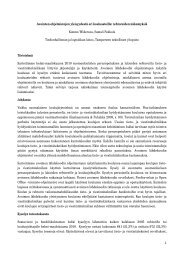the case of the 'urban villas'
the case of the 'urban villas'
the case of the 'urban villas'
Create successful ePaper yourself
Turn your PDF publications into a flip-book with our unique Google optimized e-Paper software.
Jason Linn<br />
Ph.D. candidate, History<br />
University <strong>of</strong> California at Santa Barbara<br />
Snuggling with your identity: Beds in Roman culture<br />
What attitudes did Romans have about beds? They had beds for different life circumstances:<br />
<strong>the</strong> birth bed, <strong>the</strong> marriage bed, <strong>the</strong> sick bed, <strong>the</strong> death bed. In this paper, however, I focus on<br />
its most frequent and private function—<strong>the</strong> sleeping bed. Using literary sources from <strong>the</strong> first<br />
century BC to late antiquity, I argue that Romans believed beds indicated who you were—<br />
your civilization, your social status, and even your character.<br />
Beds distinguished <strong>the</strong> civilized from uncivilized. Romans considered peoples who<br />
slept without beds to be uncivilized. The Huns slept on horses; <strong>the</strong> Cynegi in trees; Iberian<br />
mountaineers on <strong>the</strong> floor. Beds separated humans from animals. In fact, Romans disdained<br />
anything linked with animals, such as using skins as covers or hay as mattress stuffing. Thus,<br />
Romans believed in a correlation: <strong>the</strong> more unnatural <strong>the</strong> bed, <strong>the</strong> greater degree <strong>of</strong><br />
civilization achieved.<br />
Beds could also be luxury items, reinforcing elite identity by separating <strong>the</strong>m from<br />
commoners. A change in bed could connote a demotion or promotion in status, such as<br />
Nero’s squalid sleeping arrangements after he became a fugitive. Contrary to locally-made<br />
commoner beds, elite beds were foreign-made. Tyrian purple sheets, Leuconian mattresses,<br />
and many small pillows marked an elite bed.<br />
Beds also revealed an individual’s and a society’s character. Although beds were<br />
<strong>of</strong>ten shared, <strong>the</strong> one place that connoted private space—underneath <strong>the</strong> pillow—disclosed a<br />
person’s character. Plutarch envisaged Spartans designing <strong>the</strong>ir austere beds to create battle-<br />
hardened men. Romans debated how beds affect <strong>the</strong> body. Some writers chided soldiers for<br />
sleeping in s<strong>of</strong>t beds, believing that comfortable sleep effeminizes. Medical writers posited<br />
that hard beds caused disease, while moralists asserted that beds did not affect one’s<br />
constitution. In short, I contend that Roman beds were divisive objects.

















